The Dutch in Africa, Camping Zebra, Ouzoud
Zagan the motorhome’s still. He’s calmly looking out over the African hills from a terrace at Camping Zebra (see previous post), just outside Ouzoud in the Middle Atlas mountains. Yesterday’s sunshine’s left us to rain again, just as the Dutch campsite owners Paul and Renate pulled off in their 4×4. They’re heading to meet friends at Merzouga, alongside the Erg Chebbi dunes, a day-and-a-half’s fast driving away.
It’s been fascinating talking with Paul and Renate. They’ve been here in Ouzoud for over a decade, building up the campsite, along with rooms which they also rent out. We spoke about the sale of the site, and I asked if they expected to be in Morocco another ten years. At this point Paul executed a trademark smile, a thoughtful thing, and relayed a story.
Back in the late 90’s he owned a company which supplied and installed telephone equipment in the Netherlands. The business was doing well, and had grown to 10 employees. Plans were afoot to increase it to 25 people, architect’s drawings for a new office and workshop were agreed, and the bank funds were signed off. And then he fell off his motorbike. A ‘small accident’ he called it, and I guess it was in the grand scheme of things. On a race track somewhere his bike slid, then gripped, and threw him in the air, a classic and usually painful ‘high side’ crash. He dislocated his shoulder and broke his hand. Renate had to dress him, wash him and tend to him until his body healed. With his arm in a cast, he said, he looked at Renate one day and uttered something along the lines of: “let’s sell everything and go and travel Africa”. She readily agreed. Within a year practically everything they owned was sold, they’d bought a Toyota Hilux pick-up, and spent the following four years touring and working across Africa. They painted the Hilux in black and white stripes to cover the rust, hence the name of the campsite they subsequently built: Zebra.
I’m nervous about the sub Saharan Africans down in Marrakesh, and asked Renate whether they were there, working the roundabouts and traffic lights. “Yes, they’re there, Senegalese” she said. They’d been sent to Europe by their families, but the ‘friends’ who were to help them make the journey disappeared once they arrived in North Africa, and they’re now trapped, getting to Europe is impossible. Renate’s view was conditions in their native countries need to be improved to stop the movement in the first place, but she was unsurprisingly cynical about how this could be brought about. Voluntourism (people paying to volunteer) sounded like a waste of time: the money volunteers spend doing jobs the locals themselves could do would be better off spent elsewhere. After NGOs completed a technology or infrastructure project and left, the locals would sell the equipment. Difficult. The problem, Renate said, was down to the way people think in Africa, and that’s a hard thing to change.
She went on to tell a couple of stories.
The first was of a child who swept the floor in a campsite she managed for 6 months, in an African country, which one I forget. The boy couldn’t afford school, so they paid for his education for three years, with a local keeping an eye that he was going to school and not using the money to buy food. After three years he got his diploma, and went on to manage the same campsite he’d been sweeping up. A German girl appeared on the scene, and he quickly learned German, married her and now lives in Germany, studying to manage a hotel. Renate looked proud, but was quick to point out this was a one-to-one interaction, a different thing entirely to changing an entire country.
The second story was about here in Ouzoud. A German friend who lives nearby has a child in the local school, which has no toilets. He asked Paul and Renate if they’d contribute to the cost of installing a toilet. “No” was the answer, which sounds bizarre at first, until the rest of the story came out. They said they’d pay towards the materials but not the installation itself. When the plan was presented to the community, they asked when the Europeans would build the toilet. “No, we won’t build it, you will” was the answer. The locals asked how much the Europeans would pay to hire builders. “Nothing” came the answer, “it’s not hard, you all could complete the work together in a weekend”. The materials are sat waiting months later. Renate didn’t say as much, but my feeling was they wanted the locals to take ownership of the toilet, so it wouldn’t fall into disrepair once built. “It’s like that here” Renate said, “they think individually”.
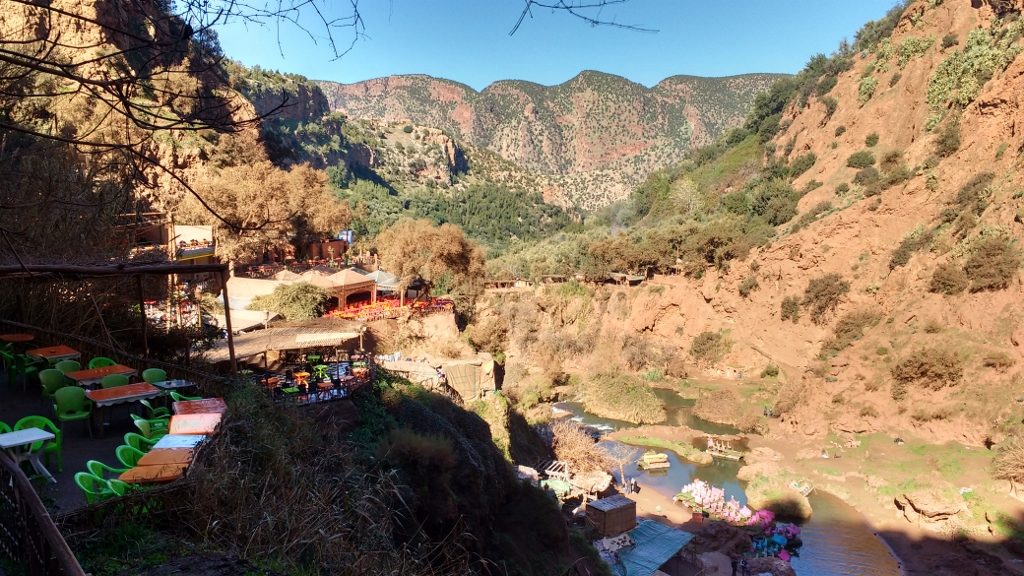
Looking down the valley from the Cascades d’Ouzoud
We also took the opportunity to interrogate Paul, as and when we could grab him and as questions bubbled up. “You’re not wearing a helmet?”. The smile, as he sat atop his off-road motorbike. “Yar, it is the law to wear one, but the law hasn’t made it to Ouzoud”. Paul went on to tell us we’re a bit back of beyond here, and the rule of law’s a little relaxed. We asked him about the massive hotel being built above the falls, in complete contrast to the houses knocking about the town and the hovels in the countryside. “Yar, they’re still working on it, it’s due to be finished in 2020, so plenty of time”. “There are some stories about this hotel you know”. The smile. Planning laws in this area forbid anything more than three storeys – ground plus two above. The hotel’s four or five, but someone knew someone, and the plans were signed off. They spent 18 months pouring concrete for the foundations alone.
The rear wall of the hotel is set 2 metres from family homes and riads which once had a great view of the falls. The hotel’s buying them one by one (for a reasonable price it sounded), before knocking them down to make a car park. More smiling from Paul: this is Africa, this is how things are done. Paul was in favour of the hotel coming, as with it comes infrastructure. The electricity on the site suffers brown-outs as the voltage to the town varies over time. There is no 4G Internet, and the ADSL conks out regularly. Before the hotel opens he knows these will be sorted.
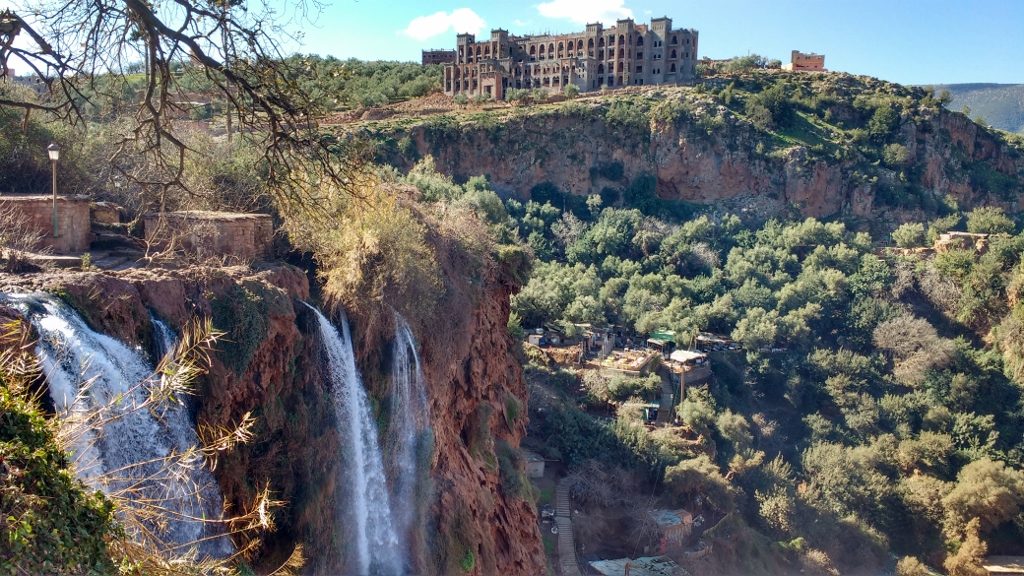
The new hotel in Ouzoud
We had a walk down to the falls, this time without Charlie. They’re beautiful, and like huge swathes of lovely Italian coastline, are being submerged under the weight of tacky, unrestrained low-quality building. We’re within ‘side trip’ distance of Marrakech here, so coaches and tourist taxis make the trip up through the hills to drop off punters for an hour or two’s look around before rolling back off the hill. As well as the expensive hotel (its rooms will rent for €200 a night, compared with the €20 to €40 for a room here on the campsite), a shanty of tat shops and cafes line the route down to the bottom. Touts, faux guides and beggars provide a gentle form of sleazy intimidation to top off the gaudy nature of the thing. One chap fed a couple of macaques, and tried to sell us nuts. Further on a faded sign requests, in French and Arabic, that we must not feed the wild animals.
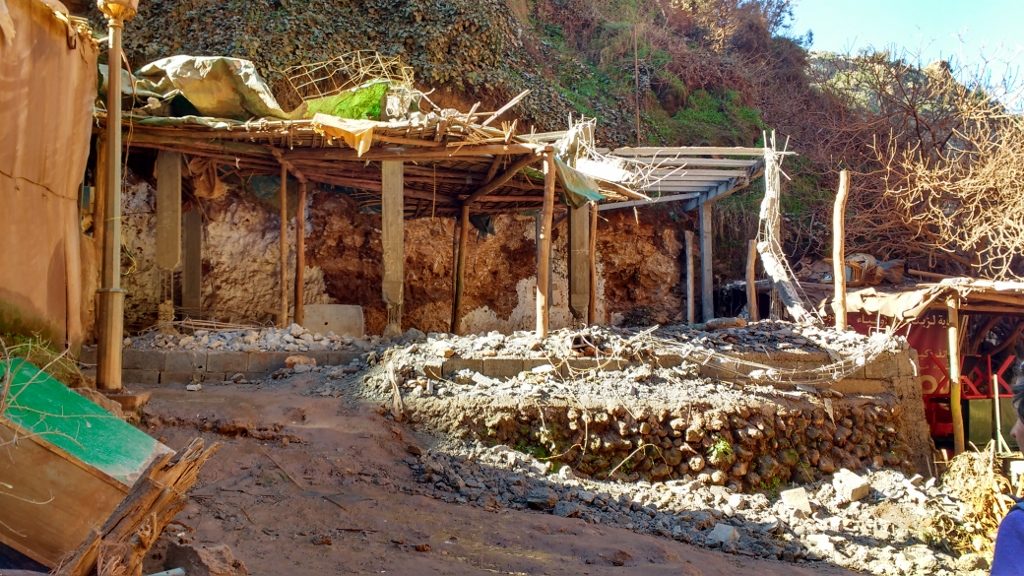
One of the abandoned shanties on the walk down to the bottom of the Cascades d’Ouzoud
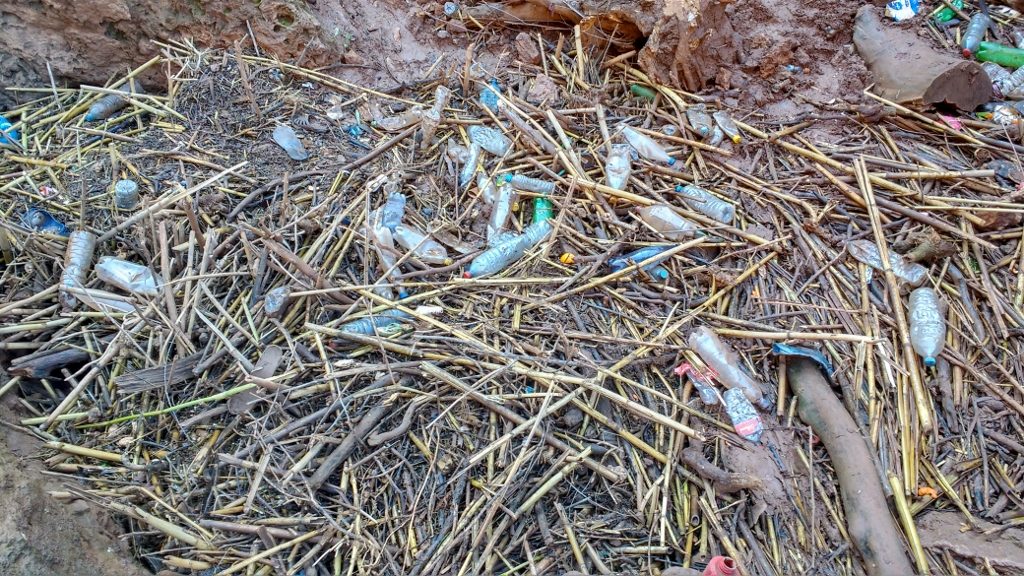
Rubbish collecting in a pool at the bottom of the falls. Folks sit about. No-one collects it, drags it off and burns it. Instead rubbish is being thrown into the valley just a short distance from the tumbling waters
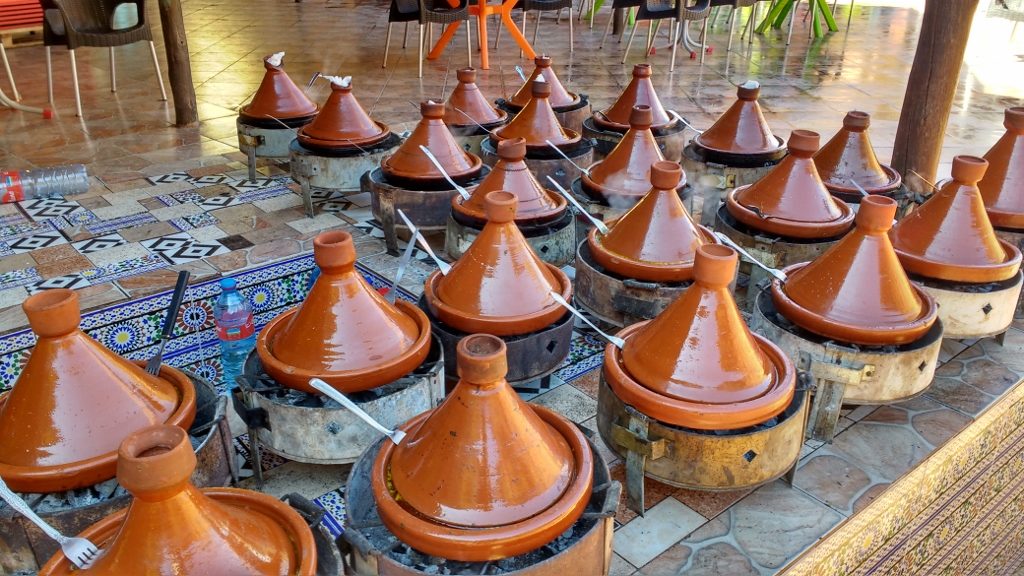
Tagines being cooked in one of the cafes. Not all of them are tacky: some look tempting, but they’re crowded out (for me at least) by the overall tourist trap nature of the place
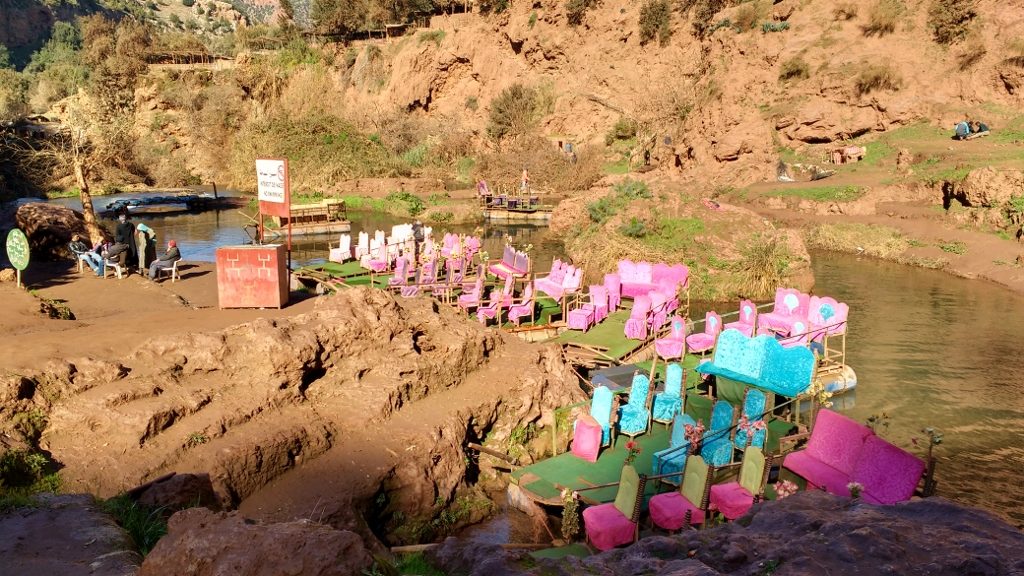
Enterprising locals have made boats to take you on the tour of the falls – all of about 10 metres away. Signs forbid swimming in the main pool
I’m not naïve, well I am, but not that naïve. Tourist money is big money here, and relatively easy compared with working the land at least. If I were a local, would I want to knock up a cafe within sight of the falls? Probably, if I could scratch together the money to do it and overcome the fear of failure. Is there an answer? A way to make natural beauty spots like this profitable for the locals without ruining them at the same time? I think there must be (the Croatians have managed it with Krka and Plitvice), but it would involve collective thinking. The community working together, and it seems like that’s just not how people here work, not how the overall system works.
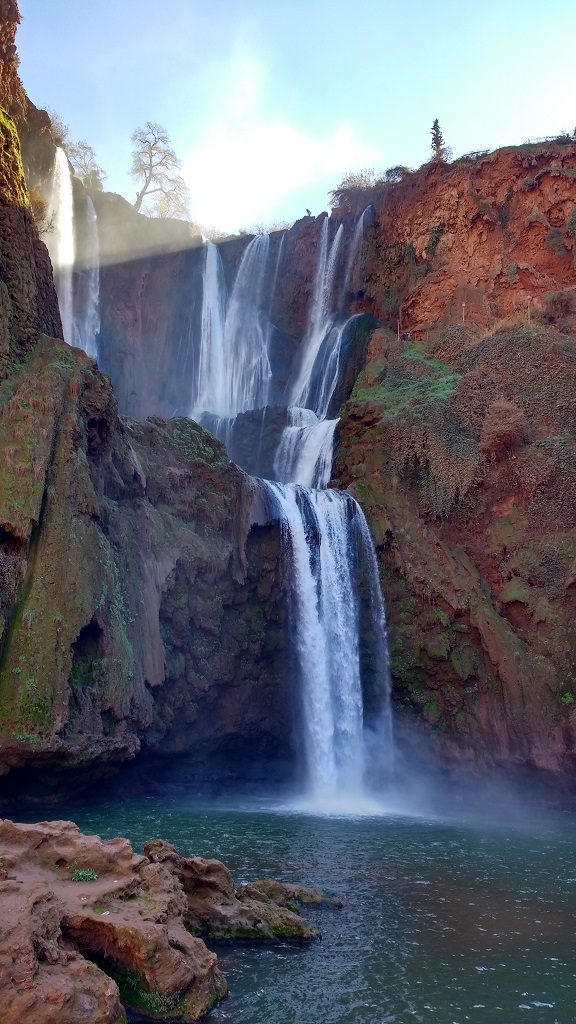
The Cascades d’Ouzoud
We ate in the campsite restaurant yesterday. Like the rest of the site it’s a fusion of Africa and Europe. The kitchen’s open to the eating area, and looks spotless. The gas comes from a bottle outside, via a pipe through the wall. The ceiling is the flowing, coloured cloth of a Berber tent. A laptop sits to one side. A puppy and a cat sleep in beds next to where we ate, warmed by a wood burner and a gas heater. The tables are on gravel: which you never need to clean. Sofas to one side are made from concrete, with comfort added by cushions.
The tagines were novel and delicious: mine had beef, apple and cinnamon, the “Zebra” they called it. After eating we mucked about a bit with some tall drums, stared at a map of Morocco on the wall, inspected the multi-lingual book library and chatted with Paul. These guys are the real deal in terms of African travellers: they speak about breakdowns in the desert like calling up the AA from the M1: “someone will come, just ask them to call the dépanage”. “Yar, Erg Chebbi, we call this the Micky Mouse desert”, referring to the huge dunes near Merzouga. They’re nothing compared with the enormity of the deserts to the south, all of which Paul seems to have conquered, one by one. I feel a bit of a wimp.
Cheers, Jay

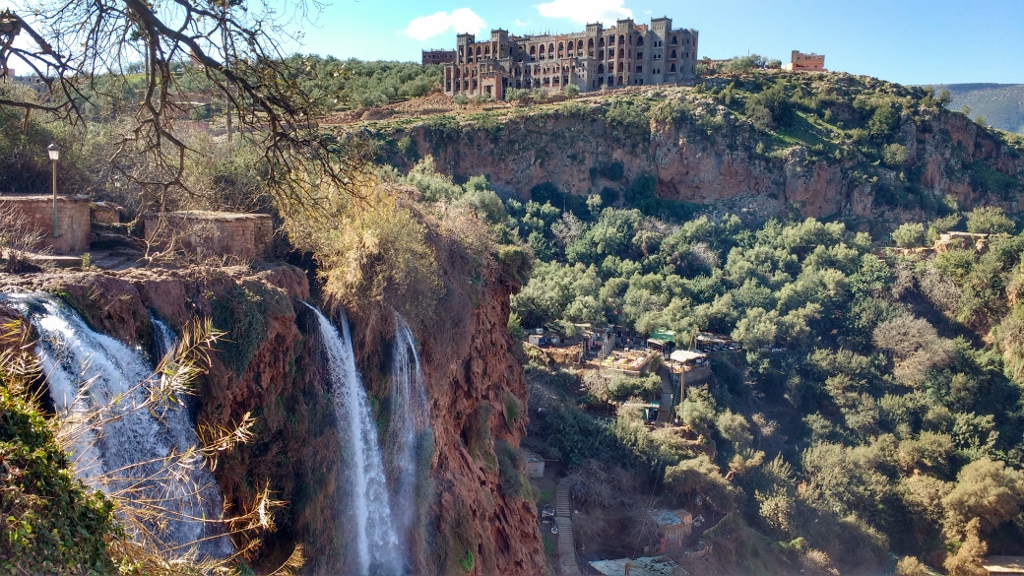
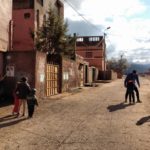
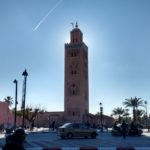
Wstunning photos folks and loving your observations on life and the people you meet. We love travelling too and if you caught our links you wil see where we have been but certainly not as adventurous as you. I trigedto know where your companions are from as we hail from Cornwall too. Not sure what your plans are but we are hoping to set off on March 30th heading to Sicily and as we are car buffs to see the Targa Flioro or however you spell it in Mid April.
Hi!! Fantastic post as always!!
I know you like a good read. I have just discovered John Steinbeck, ‘Travels with Charlie’…..and yes, Charlie is his dog. They travelled America in 1960 in an early motorhome. A bit like an early blog! He makes great (and prophetic) observations. I think you would enjoy reading it….look out for it!